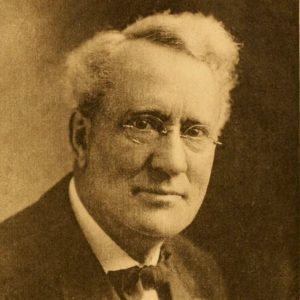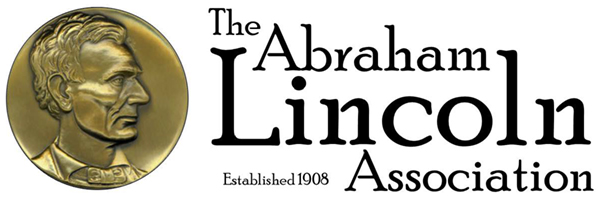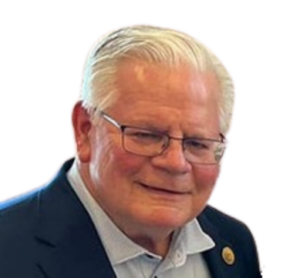
William "Bill" Shepherd (2024-present)
William “Bill” Shepherd, a graduate of the University of Nebraska Law School in 1977, has led a distinguished legal career marked by a commitment to public service and a passion for history, particularly the life and legacy of Abraham Lincoln. Following his admission to the Illinois Bar, Shepherd practiced law in Rockford, honing his skills with an insurance defense firm. In 1982, he transitioned to Chicago to serve as assistant attorney general in the Office of the Illinois Attorney General. Shepherd’s expertise extended to the Illinois State Senate, where he drafted legislation on nuclear energy regulation and contributed to shaping the groundbreaking State Telecommunications Act. Governor James R. Thompson appointed him to advocate for small business consumers at the Illinois Commerce Commission. In 1990, Shepherd joined the State Farm law department’s legislative/regulatory section, representing the company in various forums. Beyond law, Shepherd’s profound interest in history, especially Abraham Lincoln, drove extensive research and insightful writings on Lincoln and the Civil War. His dedication to Lincoln’s memory is shared by his wife, Mary, former executive manager of the Abraham Lincoln Association. Together, they honor Lincoln’s legacy, reflecting Shepherd’s commitment to both legal excellence and historical preservation.
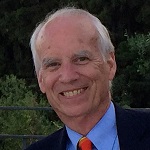
Michael Burlingame (2020-2024)
Michael Burlingame, holder of the Chancellor Naomi B. Lynn Distinguished Chair in Lincoln Studies at the University of Illinois at Springfield, was born in Washington DC and attended Phillips Academy, Andover. As a freshman at Princeton University, he took the Civil War course taught by the eminent Lincolnian David Herbert Donald, who took him under his wing and made him a research assistant. When Professor Donald moved on to Johns Hopkins University, Burlingame upon graduation from Princeton followed him to that institution. There he received his Ph.D. In 1968 he joined the History Department at Connecticut College in New London, where he taught until retiring in 2001 as the May Buckley Sadowski Professor of History Emeritus. He joined the faculty of the University of Illinois at Springfield in 2009. Prof. Burlingame has edited over a dozen volumes of Lincoln primary source materials. He is also the author of The Inner World of Abraham Lincoln (1994) and the two-volume Abraham Lincoln: A Life (2008). The latter won the 2010 Lincoln Prize, was a co-winner of the annual book prize awarded by the Abraham Lincoln Institute, and won the Russell P. Strange Book Award given annually by the Illinois State Historical Society for the best book on Illinois history. Burlingame has received the Abraham Lincoln Association Book Prize (1996), the Lincoln Diploma of Honor from Lincoln Memorial University (1998), Honorable Mention for the Lincoln Prize, Gettsyburg College (2001), and was inducted into the Lincoln Academy of Illinois in 2009.
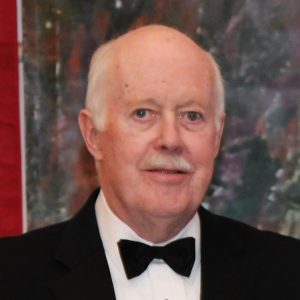
Bob Willard (2018-2020)
Bob Willard has collected books and other material about Abraham Lincoln for six decades. He is a long-time director and past vice president of the Abraham Lincoln Association, a director and past president of the Abraham Lincoln Institute, advisor to the Lincoln Forum, and past treasurer of the Lincoln Group of the District of Columbia. He was an advisor to the Lincoln Legal Papers project and the Lincoln Digitization project at Northern Illinois University. In 2005, Willard traveled the Lincoln trail from the birthplace in Hodgenville, Kentucky, through southwestern Indiana, ending at Lincoln’s tomb in Springfield, Illinois; in four weeks he covered 1,000 miles, including 200 miles on foot. He has served in the federal government as a senior executive and was also responsible for marketing and government relations in several legal publishing companies. Before 1985, Willard was an association executive in Washington, DC. Earlier, he was a congressional staffer and an educational fundraiser. Willard was an engineer officer in the U.S. Army with duty in Korea, Vietnam, and the Pentagon from 1966-1970. Willard received a master’s degree in Operations Research and System Analysis from George Washington University and a bachelor’s degree in International Relations from the Georgetown University School of Foreign Service. He is retired and lives with his wife, Carolyn, in Southern California.

Kathryn M. Harris (2016-2018)
Kathryn M. Harris is the first woman and the first African American to serve as the President of the Abraham Lincoln Association since its inception in 1909. Harris retired in 2015 as the Library Services Director/Director of the Abraham Lincoln Presidential Library, formerly the IL State Historical Library after more than 25 years of service. She has served on the Board of the IL Library Association and the Consortium of Academic and Research Libraries in Illinois (CARLI); in addition she is a Past President of the Sangamon County Historical Society and is a recipient of a Lifetime Achievement Award from the IL State Historical Society. She has been recognized by the Springfield Rotary Club and is a Paul Harris Fellow; she was honored as a Woman of Influence by the Springfield Business Journal and recognized by the Society of Public Administrators. Harris presents one woman shows of four historic 19th century African American Women to school children, civic, church and social groups, but her favorite character is Harriet Tubman.
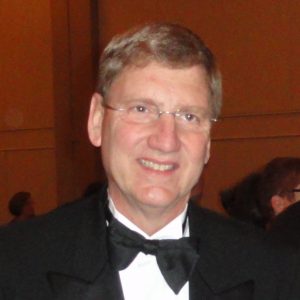
Robert A. Stuart, Jr. (2014-2016)
Bob is a partner in Brown Hay & Stephens which was founded by his great-great grandfather John Todd Stuart in 1828, the oldest law firm in the state of Illinois. He has served as president of the Sangamon County Historical Society and a member of advisory panel for the Papers of Abraham Lincoln. He is a fellow of the American College of Trust and Estate Counsel and of the American Bar Foundation as well as advisor to Leading Lawyers Network. He has chaired the ISBA Estate Planning Section Council and the Sangamon Valley Estate Planning Council. In Springfield, he has chaired the Chamber of Commerce, the United Way Campaign and the United Way Foundation. He is President Elect of the National Recreation Foundation. For service in masonry, he has been awarded the 33rd degree. The Illinois Association of Park Districts presented him its lifetime appreciation award. Bob has been Rotary club president, district governor and one of 17 directors on the international board of Rotary International. He chaired RI’s constitution and bylaws and operations review committees, raised funds for Rotary’s 7 global Peace Centers. He has immunized children in Rotary’s campaign to eradicate polio, opened water wells, delivered wheelchairs, dedicated new schools following the Tsunami, worked with clubs along the Gulf Coast in post Katrina relief efforts and is currently working with Haiti Earthquake Relief Donor Advised Fund. The Rotary Foundation has given him its Citation for Meritorious Service and Distinguished Service Award.Bob has served as President of the Abraham Lincoln Council BSA and a Trustee of its endowment. He is currently Regional Chair for the National Eagle Scout Association and a member of the national committee. He has been awarded the Distinguished Eagle, the Silver Beaver and the Silver Antelope. Bob has served as trustee and elder in his church.
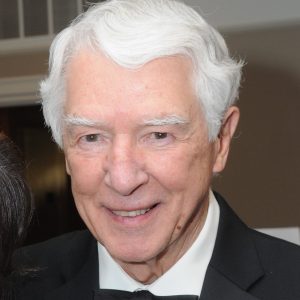
Robert J. Lenz (2010-2014)
Robert J. Lenz has been engaged in the general practice of law in Bloomington-Normal, Illinois since 1963. He was educated at Freeport High School in Freeport, Illinois, the University of Illinois at Champaign-Urbana, and the University of Illinois College of Law. Lenz is a longtime amateur student of Abraham Lincoln and has made numerous appearances as a speaker on Abraham Lincoln. He is currently the President of the Abraham Lincoln Association. From 1975-1981, Lenz served as a member of the Board of Trustees of the University of Illinois and he was president of the State of Illinois Universities Civil Service System, Merit Board. From 1971-1981 he was a member of the Illinois Board of Higher Education. In addition to his interest in Lincoln, Lenz is a past president of the McLean County Bar Association and the David Davis Mansion Foundation. He has been a delegate to the North Atlantic Treaty Organization Conference in Istanbul, Turkey; a founding board member of the Adlai Stevenson Lectures; and an attendee at the 1971 YMCA International Committee World Meeting in Kampala, Uganda. Lenz lives on a small farm near the Mackinaw River on the border of Woodford and McLean Counties.
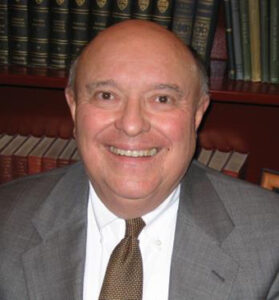
Richard E. Hart (2006-2010)
Richard E. Hart is accomplished attorney, author, and preservationist. He was admitted to practice law in 1967 and practiced in Springfield while working on historical projects. In addition to his work with the Abraham Lincoln Association, Hart is a past President and board member of the Sangamon County Historical Society, past Chairman of the Advisory Board of The Lincoln Legal Papers, member of the Illinois Abraham Lincoln Bicentennial Commission, board of directors of the Springfield Illinois African American History Foundation Museum, past Chairman of the Oak Ridge Cemetery, and past President and member of the Board of Directors of the Elijah Iles House Foundation. Hart was largely responsible for raising the funds and managing the day-to-day restoration of the Elijah Iles House and the Strawbridge-Shepherd House, two ca. 1840 Greek Revival residences. Hart is also past President of Springfield Preservation, Ltd., a for-profit corporation that has restored and leased five Lincoln-era houses in Springfield’s German Settlers Row. Hart suggested the format for the Looking for Lincoln project in Springfield and donated his personal historical research and ideas that were used for that project. Hart and his wife Ann were responsible for proposing the design for the City of Springfield’s streetscape and donating the first period lights for Springfield’s streetscape. Hart’s efforts garnered many awards, including the City of Springfield’s Preservationist of the Year (1999), the ALA’s Logan Hay Medal (2012), the Illinois State Historical Society’s Lifetime Achievement Award (2014), and the Springfield NAACP Chapter’s Legal and Political Award (2015). For over a decade Hart has been the editor of For The People, a newsletter of The Abraham Lincoln Association, and the Iles Files, a newsletter of the Elijah Iles House Foundation. Hart has made several contributions to Springfield and Lincoln scholarship, including the Spring Creek Series, focusing on Lincoln’s Springfield, and the Sugar Creek Series, focusing on the early settlement of Cotton Hill and Ball Townships in Sangamon County. Hart has also researched and written extensively on Thomas Lincoln, Abraham’s father.
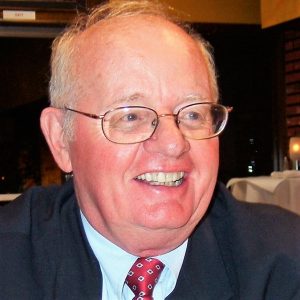
Roger D. Bridges (2004-2006)
Roger D. Bridges received the Ph.D. in History from the University of Illinois at Urbana-Champaign and put his training to good use as the newly created Director of Research at the Illinois State Historical Library. He became Director of the Library and briefly served as Director of the Lincoln Legal Papers before assuming the Executive Director position at the Rutherford B. Hayes Presidential Library and Museum. Bridges helped revive the publications program of the Association and planned the annual symposium until 1986. Bridges remained active on the Association’s board of directors throughout his tenure in Ohio. Upon his retirement, Bridges returned to Illinois and assumed the presidency of the Association. He actively promoted the symposia and publications.
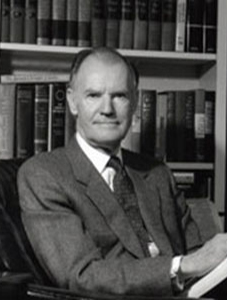
Robert S. Eckley (2002-2004)
Robert S. Eckley recalled a family story in which his great-grandfather entertained Abraham Lincoln on his farm. His interest increased with being appointed to the David Davis Mansion Foundation board. Eckley holds an M.B.A. from The University of Minnesota and a Ph.D. in economics from Harvard University. His expertise led to a dual career in higher education and business serving as chief economist for Caterpillar for 14 years and President of Illinois Wesleyan University for 18 years. He also taught courses in international business for three decades. When he joined the Abraham Lincoln Association, Eckley was immediately appointed as chair of the Endowment Committee, and he remains active in building the endowment fund.
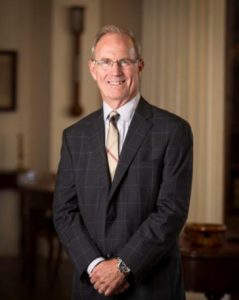
Donald R. Tracy (1998-2002)
Don Tracy served on the board of directors before being elected president of the Association in 1998. A lawyer with the firm of Brown, Hay & Stephens, Tracy has long had an interest in the leadership of the Sixteenth President as well as Winston Churchill. His efforts to promote outreach and membership resulted in the creation of the Association’s quarterly newsletter For the People. Tracy also brought to fruition many of the reforms and suggestions first raised by Davis and continued with Bannister, especially establishing an endowment fund to support the activities of the Association well into the 21st Century.
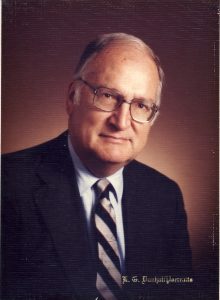
Dan Bannister (1996-1998)
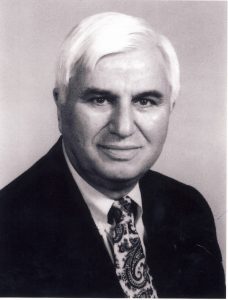
G. Cullom Davis (1995-1996)
Elected in 1995, G. Cullom Davis had been one of the founding faculty members in the History Department at Sangamon State University, now the University of Illinois at Springfield. A descendant of Governor and U.S. Senator Shelby Cullom, Davis took over as Director of the Lincoln Legal Papers in 1988. Davis had been on the board of directors of the Association since 1977, serving on committees that planned the annual symposium and publications. During his two years as president, Davis oversaw an extensive and thoughtful review of the Association’s bylaws and organization, leading to the rewriting of bylaws, a reorganization of the committee structures, and an active recruitment of new board members.
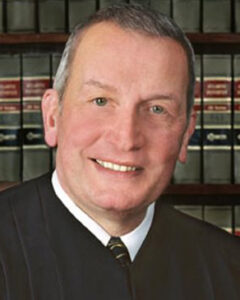
Frank J. Williams (1986-1995)
Frank J. Williams began his life-long obsession with reading and collecting anything about the Sixteenth President. He studied law and served in private practice before his appointment as Associate Justice of the Superior Court in Rhode Island from 1995 to 2001 and then his appointment as Chief Justice there from 2001 to 2008. He served as president of the Lincoln Group of Boston. In 1976, Williams was elected to the Abraham Lincoln Association’s board of directors. As president of the ALA, Williams expanded the journal from an annual to a semi-annual publication and contributed his annual “Lincolniana” column, a summary of Lincoln events and publications in that year. He worked aggressively at raising funds for research and conferences that the Association sponsored.
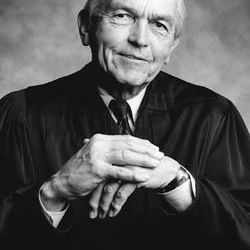
Harlington Wood, Jr. (1984-1986)
Judge Wood grew up in Petersburg, Illinois and followed in his father’s footsteps by joining the family legal practice. His resemblance to the tall, lanky Abraham Lincoln led to his being cast as Lincoln in “Forever This Land” and other historic plays performed in Kelso Hollow Theatre at Lincoln’s New Salem State Park. In 1973, Wood was assistant attorney general for the Civil Rights Division in the Justice Department and helped end the standoff between members of the American Indian Movement and the federal government at Wounded Knee, South Dakota. Wood served as United States attorney for the Southern District of Illinois; in the Justice Department during the Nixon administration; as judge on the United States Court of Appeals for the Seventh Circuit; and finally as judge for the United States District Court for the Southern District of Illinois. As president of the Abraham Lincoln Association, Wood championed the support of the Lincoln Legal Papers and established the Association’s own “Lincoln the Lawyer Award,” to highlight this important and unstudied aspect of Lincoln’s own life. An accomplished photographer and writer, Wood’s color images of Lincoln sites and public sculpture graced the covers of the annual banquet program for many years and were individually initialed and numbered by him. A delightful and engaging memoir of his life, An Unmarked Trail: The Odyssey of a Federal Judge (2008), was published months before his death on December 29, 2008.
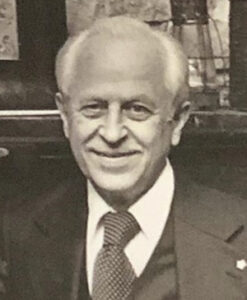
Floyd S. Barringer (1971-1984)
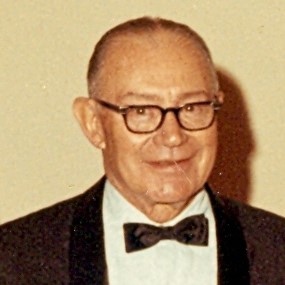
Marshall S. Luthringer (1968-1971)
Marshall S. Luthringer was born in Petersburg, Illinois and grew up in the shadow of Lincoln’s New Salem. He became president of Central Illinois Power System in 1949 and upon his retirement in 1968 turned his attention to the presidency of the Abraham Lincoln Association. Under his leadership, the Association celebrated the rededication of the Old State Capitol as a Lincoln site and began exploring the restoration of the Lincoln Home area, which was still owned by the State of Illinois. The transfer of the Lincoln Home to the National Park Service on 18 August 1971 led the Association to redirect its efforts.
Oliver J. Keller, Sr. (1962-1968)
After the initial reactivation of the Abraham Lincoln Association, George Bunn turned the presidency over to Oliver J. Keller, Sr. Owner of the radio station WTAX, Keller brought a new dimension to the Association activities by taping and broadcasting some of the more prominent banquet speakers such as Adlai Stevenson II. Under Keller’s leadership, the Association raised nearly $300,000 to purchase period furnishings for the Old State Capitol.
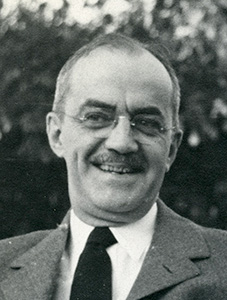
George W. Bunn, Jr. (1942-1962)
Because of the close connection of the Bunn family with Lincoln, George Bunn was very committed to completing the major research project begun by Logan Hay: the publication of the eight volumes, The Collected Works of Abraham Lincoln. Bunn liquidated all the assets of the Association to accomplish the publication of all eight volumes. From 1953 to early 1962, the Association maintained its incorporation status but did not hold annual meetings, nor did it have the resources for a staff or publications. When Governor Otto Kerner decided to restore the Old State Capitol, he asked Bunn to reactivate the Abraham Lincoln Association as a support organization in raising money for period furnishings for the structure.
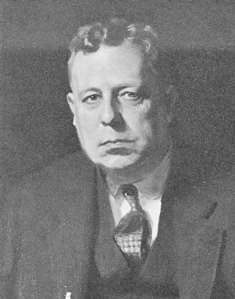
Logan Hay (1920-1942)
When John W. Bunn died in 1920, the Association elected Logan Hay. Hay came from a long pedigree of Lincolnians: his grandfather was Stephen Trigg Logan, Abraham Lincoln’s second law partner; his father was Milton Hay, who studied law in the Lincoln-Herndon law firm; his cousin was John Hay, Lincoln’s personal secretary; and he was a partner in the firm of Brown, Hay & Stephens, successor to the firm of Stuart & Lincoln. It was under Hay’s leadership that the Association made its greatest strides. Hay changed the name of the organization to the Abraham Lincoln Association, reflecting a new mission. Realizing that much of the writing on Lincoln was dated and that it repeated stories and myths about the Sixteenth President, Hay hired Paul Angle as a research associate to begin a serious and scholarly examination of the record and present new findings at Association meetings and publications. The painstaking care that attended all of the Association’s research and publications earned it widespread recognition and praise from leading academics and news organizations.
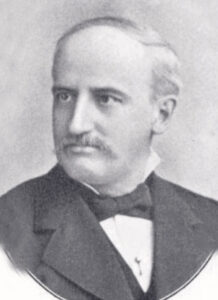
John W. Bunn (1918-1920)
